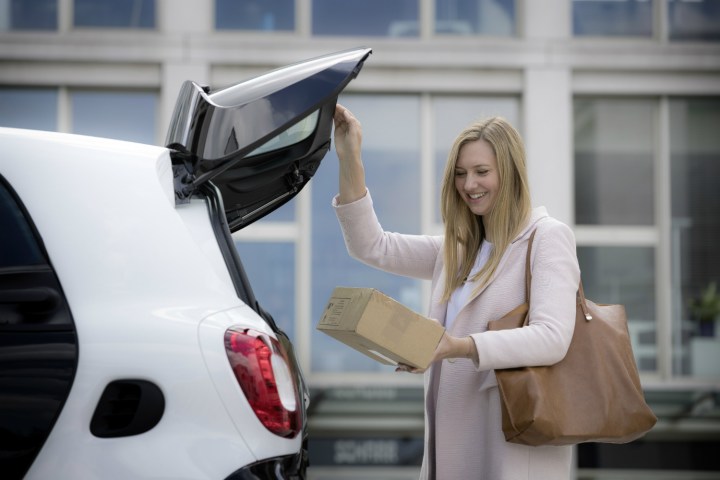
The purpose of the Ready to Drop program is to help online shoppers save time. Four components involved in the program include properly equipped Smart cars, online retailers enrolled in the program, people who own the configured Smart cars and shop online, and a delivery service.
The last and current generation Smart Fortwo and Fourfour cars can be retrofitted with a special Connectivity Box for the Ready to Drop program. Starting this fall, Smart buyers will be able to specify the Connectivity Kit as an option.
Online retailers Amazon, Allyouneed Fresh, and Fashion ID have already signed on for the program, according to Daimler. Deliveries in the Ready to Drop program are made by the DHL parcel service.
Here’s how it works. When a shopper in the program makes an online purchase from an enrolled online retailer, they specify their Smart car as the delivery address via a smartphone application. A delivery transaction number is generated during the online checkout process.
The shopper then parks the car near their home address. Cars cannot be parked in a garage because the delivery service will not be able to find them.
DHL delivery personnel will drive to the car’s location, use the transaction code on a smartphone app to unlock the car’s luggage compartment, and put the parcel in the compartment. Finally, the driver uses the same code to lock the trunk again. The delivery driver cannot finish the delivery transaction process until the trunk is re-locked.
For the first few months, the test will be confined to Stuttgart, but then will expand to Berlin and Cologne. Other cities will follow. Smart owners in Stuttgart, Berlin, and Cologne who’d like to participate in the Smart Ready to Drop program can get more information here.
According to Chairman of the Board of Management of Daimler AG and Head of Mercedes-Benz Cars Dr. Dieter Zetsche, “We are working intensively on the question of how cars can help make people’s lives easier. If the car receives parcels customers have more time to do things they really enjoy.”
Editors' Recommendations
- Microsoft’s DirectStorage can now boost your game loading times by 200%
- Eufy’s Security Smart Drop is an impenetrable mailbox for your packages
- First smart TVs, now your smart home can be compromised, FBI warns
- The Nanoleaf Canvas can now control your smart home through touch



